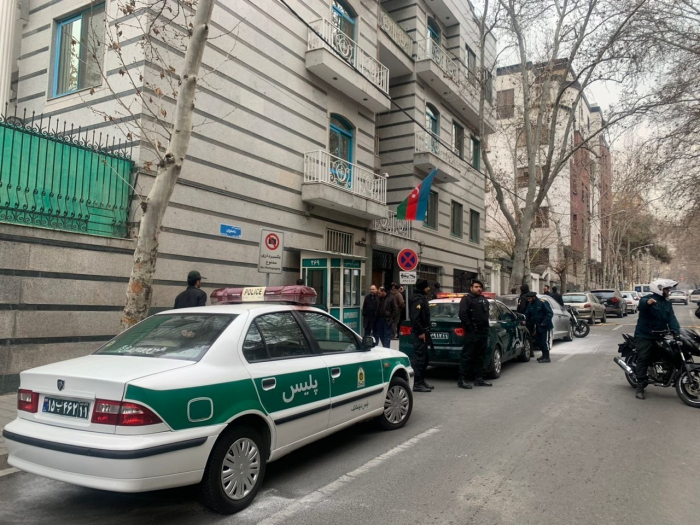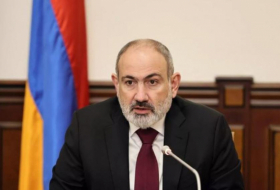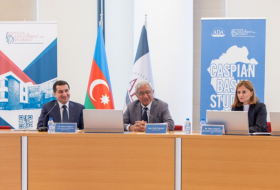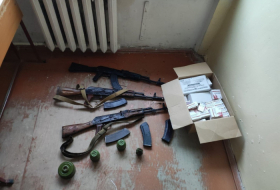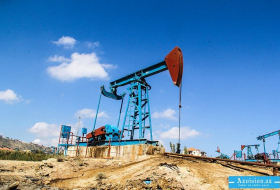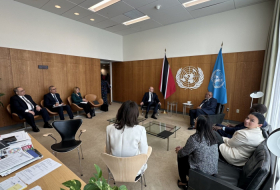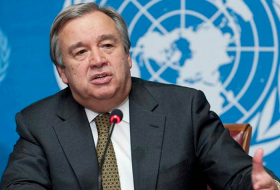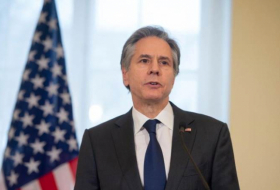As a result of an armed attack on the Azerbaijani Embassy in Tehran on Jan. 27, an Azerbaijani security guard was killed and two embassy security employees were injured. As can be seen in footage from the embassy, two employees of the Azerbaijani Embassy parked their cars and entered the building. Then another vehicle crashed into their car. A man got out, carrying a Kalashnikov.
Meanwhile, although the Iranian police in front of the embassy saw the incident, they took no action against the aggressor, who used his hand to signal the police not to move. The police stayed where they were. The attacker opened fire as he entered the embassy, martyred one security guard and injured the other. The third security guard managed to tackle the attacker and threw him out of the building. Later, the attacker was apprehended outside.
After the terrorist attack, Azerbaijan evacuated its diplomats from Tehran and completely suspended the embassy's activity. Azerbaijani President Ilham Aliyev wanted this terrorist incident to be investigated as soon as possible and the perpetrators punished. Meanwhile, foreign ministers and other countries’ embassies issued statements condemning the attack. On this occasion, the ambassadors of some countries were visiting the assistant to Aliyev and the head of the Foreign Policy Affairs Department of the Presidential Administration, Hikmet Hajiyev.
Meanwhile, foreign affairs ministers called Ceyhun Bayramov, Azerbaijan's foreign minister, to show support for Azerbaijan. In his message, President Recep Tayyip Erdoğan expressed his strong condemnation for the heinous attack and that he stands by his brother, Azerbaijan. Reinforcing this, the Foreign Ministry stated that it is of great importance to take all necessary measures to ensure that those responsible for this vile attack are immediately found and brought to justice and that it does not happen again.
Although the expectation was that this incident, which has caused a diplomatic crisis between the two states and has damaged Iran’s reputation, would be investigated appropriately, the Iranian police and prosecutor's office tried to present this event as merely a murder based on a personal grievance, rather than a terrorist attack. Immediately after the attack, the Iranian authorities put out the message that there was no need to escalate the incident. They explained that this incident was personal, based on statements by the attacker. A spokesperson for the Foreign Ministry reported that, according to the initial investigation, the attacker had stated that his motivation for the attack was “personal issues and family problems.”
Relaxed attitude toward the aggressor
Tehran police issued a statement, immediately after the events, explaining that the incident took place “on the family level” and the attacker “came there with his children.” However, the cameras at the scene of the incident revealed that his children did not accompany the attacker. According to a statement from the Tehran prosecutor, the attacker has been searching for his wife for eight months, since she allegedly visited the Azerbaijani Embassy and disappeared. Naturally, these statements of Iranian officials, whose record is not very reassuring and cannot be trusted in such developments, did not satisfy Azerbaijan, where these explanations are perceived as a diversion from the real events and an attempt to hide the real motivation.
The relaxed attitude of the Iranian police toward the aggressor, despite authorities' well-known harsh attitude toward people involved in recent demonstrations in Iran, drew attention. And, as if this were not enough, after the incident, the attacker started giving interviews to Iranian television in which he tried to justify his actions. This situation raises doubt about whether the Iranian state will genuinely investigate this attack.
On the other hand, the Iranian press immediately found a culprit and declared that third-party states were trying to disrupt Azerbaijani-Iranian relations. Some newspapers blamed Armenia, others Israel, putting out the message that the state of Iran was not responsible for the incident.
On the other hand, the Azerbaijani press reported that the Iranian government had organized this event to send a message to Azerbaijan, drawing on Iran’s support for terrorist activities in the past and the tension in Iran-Azerbaijan relations. In fact, parallel to the tensions in relations between the two countries, threats from Iran against Azerbaijan have been increasing. Last year, Azerbaijan imprisoned and expelled Iran’s proxy supporters within the country. This limited Iran’s power in Azerbaijan. Moreover, Azerbaijani citizens working to overthrow their government and instigate a regime change have been under protection in Iran and not deported, despite the requests of Aliyev.
The increasing "anti-Azerbaijani atmosphere" in Iran in recent years has played a significant role in this attack. During the term of the new Iranian government, the Iranian press has issued publications reinforcing the anti-Azerbaijani position in the country. In particular, politicians, state officials and diplomats have targeted Azerbaijan in their statements. This increasing anti-Azerbaijani rhetoric and the targeting of Azerbaijan have combined to trigger the aggression of already radical groups. Iran has tried to demonize and marginalize Azerbaijan for Iranian society. By accusing Azerbaijan of collaborating with third parties and defining the country as pro-NATO, pro-Israeli and anti-Iranian, Iran legitimized aggression against Azerbaijan in the eyes of its society.
Anti-Azerbaijani stance
Of course, for the last 30 years, there has been an anti-Azerbaijani stance in the Iranian press and among its politicians. Although this opposition has, from time to time, been reflected in relations between the two countries, the governments were nevertheless able to find a balance, and bilateral ties were therefore not significantly damaged. However, under the new government of Iran, anti-Azerbaijani groups have gained profound influence and been set free. While anti-Azerbaijani groups have increased their power, those who want good relations with Azerbaijan have been completely isolated.
Furthermore, the rightful voice of Azerbaijan has never been heard in the Iranian press. The most recent example of this occurred on the day of the incident against the Azerbaijani Embassy: the Iranian government permitted Armenians to hold an anti-Azerbaijan demonstration. On the contrary, for the last 30 years, Iran did not give Azerbaijanis living in Iran the right to demonstrate against the occupation of Karabakh and refused permission to hold a demonstration in commemoration of the Khojaly Massacre.
The Iranian state must take responsibility for this terrorist attack on several grounds. First, within the 1961 Vienna Convention on the Establishment of Diplomatic Relations framework, the Iranian state must ensure the security of foreign missions on its territory. But, as can be understood from the videos from the scene, it failed to provide this. In addition, the increasing opposition to Azerbaijan in the Iranian press and the targeting of the country are conditions that encouraged this aggressor. Finally, the Iranian media tried to legitimize the attack on a social level by allowing the aggressor to justify his attack in the Iranian press.
More about:








